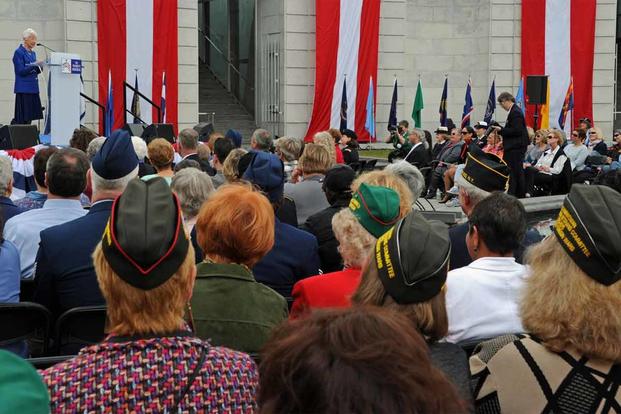A landmark bill designed to improve women's health services in the Department of Veterans Affairs took a step closer to becoming law Wednesday with a Senate committee's advance of the Deborah Sampson Act.
The Senate Veterans Affairs Committee approved the proposal unanimously, sending it to the full Senate for consideration. The legislation was approved overwhelmingly in the House last October in a 399-11 vote.
Read Next: Army V Corps Headquarters Will be First Unit to Move to Poland
The measure, S. 514, would require the VA to offer primary care for female veterans at all medical centers and clinics, expand eligibility and access to counseling for female vets who experience sexual trauma, improve standards for providing women’s health care services and provide access to counseling for post-traumatic stress disorder at retreats.
The proposal also would require the VA to offer gender-specific medical equipment such as mammography machines at each VA medical center, expand health care coverage for newborns of veterans from seven to 14 days, and establish a VA Office of Women's Health.
The measure was sponsored in the Senate by Jon Tester of Montana, the committee's ranking Democrat. He attributed the measure’s passage to efforts to educate lawmakers on the barriers that women and minority veterans face in obtaining health services and benefits at the VA.
“Women are the fastest growing population in the VA, and the VA needs to be fully prepared to meet those needs that women have,” Tester said following passage.
Sen. John Boozman, R-Ark., the bill’s co-sponsor in the Senate, also praised its passage.
"This is the first important step in ensuring women veterans have access to care in a manner that is supportive to their needs. With more women answering the call to uniform … we must ensure that we provide the very best," Boozman said.
The legislation is named for Revolutionary War veteran Deborah Sampson, a Massachusetts woman who disguised herself as a man in 1782 and enlisted under the name Robert Shurtleff. She served 17 months with the 4th Massachusetts Regiment and was wounded in combat, reportedly refusing medical treatment for a musket injury out of fears she would be identified as a woman.
The compendium bill has been a primary focus of several veterans advocacy groups, including Disabled American Veterans and Iraq and Afghanistan Veterans of America. The organizations have pressed for passage since the legislation was first introduced in 2017.
"The specific needs of women veterans are not being met," IAVA CEO Jeremy Butler said after passage in the House. "[This] brings us one step closer to providing the equal level of health care and resources women veterans desperately rightly deserve."
Other measures approved by the committee Wednesday seek to improve health care and services for several unique veteran populations, including those who served at Karshi-Khanabad Air Base, or K2, in Uzbekistan after Sept. 11, 2001, as well as former members exposed to burn pits and other environmental toxins during their military service.
The panel approved a bill that would require the VA to study the relationship between exposure to pollutants at Karshi-Khanabad and illnesses seen in veterans who served there, including cancer.
Members also approved a proposal to provide testing and health services to veterans sickened by exposure to hazardous chemicals in combat or garrison, as well as one that recognizes that veterans who served overseas in certain locations were exposed to potentially harmful airborne pollutants.
Other bills passed during the committee meeting would:
- Support construction of VA nursing homes on private lands
- Expand eligibility for mental health services at the VA for National Guard and Reserve members
- Eliminate the manifestation period limits for three conditions presumed to be related to Agent Orange: chloracne; porphyria cutanea tarda; and acute and subacute peripheral neuropathy
- Require the VA to launch a pilot program to study the benefits of programs offered at veterans retreats and nonprofits that focus on "posttraumatic growth" -- life coaching and other therapies -- to help former service members with post-traumatic stress disorder.
Earlier this week, senators also introduced several other bills to help K2 veterans, but the proposals have yet to be considered by the committee. They include legislation from Democratic Sens. Richard Blumthal of Connecticut and Tammy Baldwin of Wisconsin that would require the VA to provide health care and benefits to all K2 veterans, and a bill from Baldwin and Sens. Marsha Blackburn, R-Tenn., and Dianne Feinstein, D-Calif., requiring the DoD to conduct an epidemiological study and for the VA to include K2 veterans in in its Airborne Hazards and Burn Pits Registry, as well as the DoD and VA depleted uranium medical programs.
The bills approved Wednesday must be voted on in the Senate and signed by President Donald Trump before becoming law.
-- Patricia Kime can be reached at Patricia.Kime@Monster.com. Follow her on Twitter @patriciakime
Related: Plan Would Improve Testing and Treatment of Vets Exposed to Burn Pits, Other Toxins














